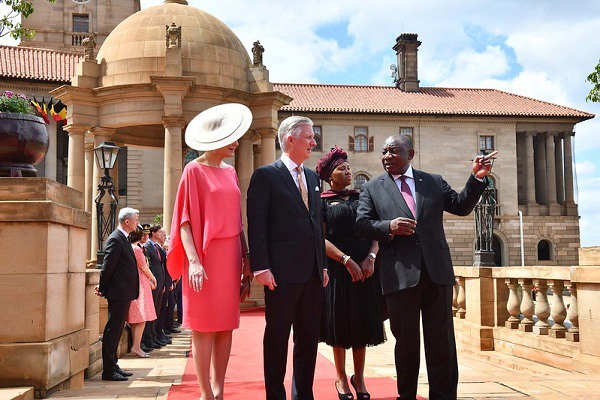South Africa’s citrus trade with the EU is currently held back by “protectionism”, President Cyril Ramaphosa told a recent bilateral trade forum between South Africa and Belgium, and with it, the aspirations of black citrus farmers whose forebears had been denied economic participation during apartheid. Queen Mathilda and King Philippe of Belgium hosted two weeks ago by President Cyril Ramaphosa and the Minister for Social Development, Lindiwe Zulu (photo: Government Communication and Information Services)
Queen Mathilda and King Philippe of Belgium hosted two weeks ago by President Cyril Ramaphosa and the Minister for Social Development, Lindiwe Zulu (photo: Government Communication and Information Services)
“With great excitement they get into citrus growing and production"
“As we parcel out land to black people, they begin to get into sectors such as citrus. We have a growing number of black people who are now in citrus cultivation and production, and those people have seen opportunities to start trading with other countries, like Europe,” the South African president said.
“With great excitement they get into citrus growing and production. As their numbers are growing their products are growing. As they seek to export, they find there’s another big citrus producer on your continent: Spain which competes with them.”
Since last season South African oranges are required to be shipped at significantly lower temperatures than before, to assuage the risk of false codling moth entering Europe. South Africa contests both the scientific basis of the ruling as well as its trade fairness and prompted the country to lodge its very first trade dispute at the World Trade Organisation.
Pres Ramaphosa continued: “As they seek to export to your part of the world, there are barriers they have to deal with. Some of them [are] completely new barriers and that keeps them back as they seek to participate in the transformation of the South African economy.”
President Ramaphosa noted that he had discussed this with King Philippe.
“I was telling His Majesty that last year a R615 million [31.2 million euro] cargo of citrus stranded at sea because it could not be allowed into Europe by virtue of one barrier that had been set up."
The King and others in the Belgian trade delegation had referred to a principle held dear, Ramaphosa said, by Nelson Mandela as well: the principle of inclusivity.
He called on the Belgian delegation to support trade "on an equitable basis. We want all countries to be mutually beneficial.”
After the visit the South African Presidency reiterated that Belgium was one of the country’s most important economic and export partners.
In 2020, South Africa exported 2.38 billion dollars to Belgium in sectors such as diamonds, delivery trucks, organic chemicals and precious metal scraps.
